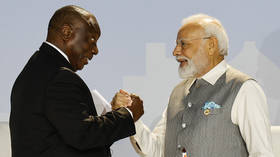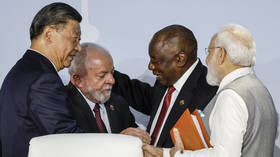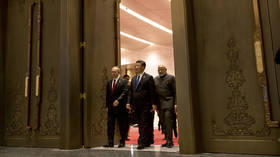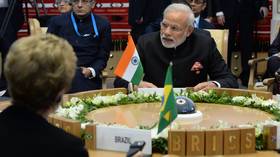BRICS Nations Want What is Theirs & They Will Get It With the Addition of FORTY Countries Joining
BRICS nations just want what is theirs, and that spells doom for the Western hegemony

Noted columnist Pankaj Mishra calls BRIC a “casual acronym” coined by Goldman Sachs economist Jim O’Neill in 2001 to draw attention to investment opportunities in Brazil, Russia, India and China. But it became much more significant when Russia initiated the formation of the eponymously titled global body in 2009.
A year later South Africa joined them, making it BRICS. The whole exercise was conceived as a counterweight-in-the-making to the West-obsessed United Nations, the World Bank, IMF and other multilateral organizations that follow – in the terms of top-notch thinkers and economists – a neo-colonial policy with the US dollar as the reserve currency.
The BRICS nations, which had either rung out old monarchies or liberated themselves from colonial oppression, had long craved decolonization, but the US and its allies used every pretext to delay this overdue process. In the meantime, there were efforts such as the Non-Aligned Movement (NAM) that demonstrated the passion of multiple countries to break out of the clutches of American-centric global institutions, especially financial institutions, which had become instruments zealously used by the US and certain former colonial powers to control the resources of other countries.
Any bid to question the hegemony of these global power structures was considered blasphemy, and the Western mainstream media promptly denounced any alternatives to the economic order of the day as non-starters or damp squib. At the same time, they kept silent on the aspirations of the countries that had fought colonial and expansionist powers tooth and nail in the first half of the century to rewrite world history.
The inclusion of six new members to BRICS at the recently concluded Johannesburg summit attracted international attention, but the highlight of the discourse so far has been pessimism about the grouping’s potential success. True, BRICS, or BRICS+ now thanks to its expansion, has not outlined alternative institutions it is planning to build. Neither is it an ideologically aligned entity like the G7. Nor has this grouping, which has been meeting annually on a rotational basis under the chairmanship of its member countries since 2014, chalked out any common aims in foreign policy – in fact, they do not have much in common except that they are aggrieved at being unfairly treated by the West and its satellite institutions since the end of World War II.
What BRICS has is a bank it created in 2015 called the New Development Bank (NDB), formerly known as the BRICS Development Bank, with the aim of “mobilizing resources for infrastructure and sustainable development projects in emerging markets and developing countries.” But it is still at an early stage.
So, what else does it have, Western commentators ask, some terming the summit “semi-farcical” and “meaningless.”
It’s simple. These countries don’t want to be denied certain advantages that they are entitled to in the age of globalization. The times they are a-changin’, as Bob Dylan sang. The commentariat who see trade alone as the focus of BRICS+ must look at the political fragmentation taking place in the world where each country – from Asia to Latin America to Africa – is standing up to protect its own interests instead of remaining loyally aligned to blocs, no questions asked.
Ethiopia – a new member of BRICS that like the other five additions will join the grouping on January 1, 2024 – is one of the fastest-growing African economies. The addition of Saudi Arabia, Iran and the UAE will more than double BRICS’ share of global oil production to 43%. Argentina, although politically volatile, has lately seen a boom in mining, especially of the much-sought-after critical metal lithium. For cash-strapped Egypt, this association is an opportunity to attract new investments for development without dollar transactions adding to its foreign-currency pressure. According to Reuters, over 40 countries have expressed interest in joining BRICS.
This means the craving among countries from across continents to ride the BRICS bandwagon comes from the realization that US power is declining. Western columnists who endlessly insist on differences within the existing five members must pay attention to how, all through history, new economic interests have helped resolve longstanding feuds. Take the unlikely rapprochement effected by China between bitter foes Iran and Saudi Arabia! Similarly, for Indian Prime Minister Narendra Modi and Chinese President Xi Jinping, such new priorities could offer a historic opportunity to go down in the annals of world history as statesmen who gave peace a chance.
I spoke recently to Richard D. Wolff, noted American economist, public intellectual, and radio host. This professor of economics emeritus at the University of Massachusetts, Amherst, and a visiting professor in the graduate program in international affairs at the New School told me in an interview that the short-term effects of the inclusion of new members to BRICS “include greatly expanding the knowledge and awareness across the world that a new world economy now exists, one no longer dominated by the US and its allies (G7).”
He points out that the latter must now share global economic power with China and its BRICS allies. His prophecy is this: “Every Global South country now has two options, not one, in securing development loans, grants, investments, and trading partners. The two (the West and BRICS) will compete to secure contracts and deals. This change is momentous as it alters the global economic status quo in place since 1945.”
In the longer run, according to Wolff, the rise of BRICS marks the further decline of the US empire and thus of US capitalism that significantly depends on that empire. “The US declining global economic footprint, the decline of the US dollar as a central bank reserve holding, the decline of the dollar as the global trading, investment and loan currency – these are all signs and symptoms of the reduced US role,” he states. Wolff shares the view of several other economists who contend that the US experience now is what the British empire and British capitalism suffered in the century before 1945. The consequences of US decline are already visible domestically in a strange and dangerous domestic civil splitting, the bizarre politics of Trump, and the resurgence of white supremacy, he avers.
Again, nobody disputes that there are differences of opinion within BRICS. For its part, India seeks an enhanced multipolarity in the world, but it doesn’t want the forum to become overly anti-West to the extent that it becomes a platform for China’s one-upmanship. New Delhi wants greater economic cooperation among non-Western countries. It doesn’t however relish the prospects of BRICS+ championing a China-first policy that hurts its military and trade cooperations with the West. India wants it to be a non-Western entity, but not rabidly anti-West. For India, this distinction is crucial.
But even the most neocon commentators who are silent on the splits within G7 cannot deny that the best days of the US economy are over and that the world order is shifting eastward. At this moment, there will always be desperate measures on the part of the existing hegemon to fight back inevitable change, perhaps through confrontation or through cooperation. Many economists hope that the countries in the Global South, those long denigrated, will have a greater reason than now to stick together. It is in that context that BRICS+ acquires a halo.
The statements, views and opinions expressed in this column are solely those of the author and do not necessarily represent those of RT.





 Outlined here is a mapping of the new paradigm emerging around the BRICS nations (Brazil, Russia, China, India and South Africa), how the United States can join this revolutionary new dynamic, the intellectual and political leadership provided by Lyndon and Helga LaRouche over the last forty years to make this vision a reality, and an epistomological overview of where mankind, as a species, is headed were this new paradigm to envelop the entire planet.
Outlined here is a mapping of the new paradigm emerging around the BRICS nations (Brazil, Russia, China, India and South Africa), how the United States can join this revolutionary new dynamic, the intellectual and political leadership provided by Lyndon and Helga LaRouche over the last forty years to make this vision a reality, and an epistomological overview of where mankind, as a species, is headed were this new paradigm to envelop the entire planet.













